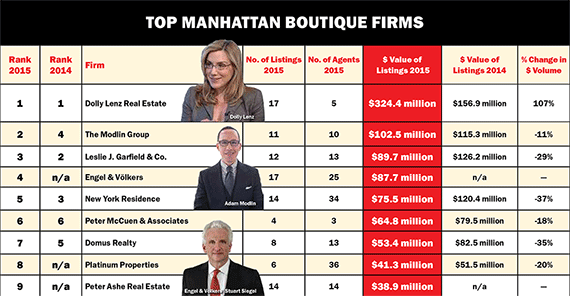Big-ticket properties bolstered the brokerages that led this year’s annual ranking of boutique Manhattan firms, thanks to a booming luxury market. But the lack of available inventory was a very real issue for the majority of the companies on the list, and some firms saw their listings volume slip once they closed on mega deals.
Power broker Dolly Lenz, who topped the ranking, lived up to her reputation with a whopping $324.4 million worth of exclusive listings, up from $156.9 million in 2014, according to The Real Deal’s data, which was culled from On-Line Residential on March 29 in a one-day snapshot. Firms with between two and 49 agents in OLR qualified.
Her firm, Dolly Lenz Real Estate, which has five agents, is currently marketing a $75 million penthouse at the Ritz-Carlton in Battery Park City, which Lenz snagged from Nest Seekers International’s Ryan Serhant. Previously, the two-unit combination was marketed as three units asking a combined $118 million.
Lenz also has the listing for the $72 million penthouse at One Madison and a $53 million pad at 2 East 67th Street. It’s worth noting that Lenz’s massive dollar volume of listings is on par with the far larger firms toward the top of the mid-sized list. A representative for Lenz, however, said because the firm does not use OLR, the figures are inaccurate and should be even higher.
Collectively, the top nine boutiques had 103 listings worth $878.2 million, a roughly 10 percent jump from 2014’s ranking.
That jump corresponded with price increases in the luxury market, where the majority of these boutique firms compete. According to real estate appraisal firm Miller Samuel, the average sales price in the luxury market was $7.3 million during the first quarter — down slightly from $7.4 million last year, but still far higher than the $5.1 million in 2013’s first quarter.
But not all of the featured firms saw an uptick in the dollar volume of listings, and smaller firms are notoriously susceptible to the market’s ebbs and flows, since a listing or two can change a firm’s status dramatically.
This year’s No. 2 firm, the Modlin Group, clocked in with 10 agents and $102.5 million worth of listings. In a telling sign for boutique companies in general, the firm jumped two spots in the ranking, despite seeing its listing dollar volume dip from last year’s $115.3 million.
But brokerage founder Adam Modlin said the numbers don’t reflect three big-ticket properties listed after March 29. Those three properties, which include actress Demi Moore’s $75 million triplex at the San Remo, “will go on the market for over $125 million,” he said.
This year, Modlin anticipates seeing the firm’s business double. He said the company’s niche extends beyond brokerage and dovetails into acting as an advisor for clients.
“Clients don’t need a broker to just open the door,” he said.
Meanwhile, townhouse specialist Leslie J. Garfield took the No. 3 spot. The firm had $89.7 million worth of listings, a significant drop from $126.2 million last year.
However, company president Jed Garfield said the firm recently closed on several large deals that weren’t factored in the tally, including the sale of 1143 Fifth Avenue for $32.5 million.
“Our value proposition is that we know a specific market. We know who is buying and selling,” said Garfield, who added that he considers the biggest firms to be his primary competition.
“There are so many companies that are all things to all people,” Garfield said. “It’s probably one of the reasons we’ve been doing better the last few years. We stick to one thing.”
Meanwhile, European high-end brokerage Engel & Völkers, which launched a Manhattan office in 2014, debuted on the list this year at No. 4 with 17 listings asking a combined $87.7 million.
Led by Stuart Siegel, a veteran broker formerly with Sotheby’s International Realty, the firm is marketing two condos at the Plaza’s Private Residences, one of which is listed at $20.4 million and the other at $18.3 million. Siegel said Engel & Völkers’ hallmark is its ability to connect international buyers with local brokers and properties. “We are a global business; we happen to be in the New York office,” Siegel said.
Finding a sweet spot
Faced with low inventory and high competition, some smaller firms are recalibrating to boost their bottom line.
Platinum Properties, which appeared on the ranking of mid-sized firms last year, joined the ranks of boutique firms this year, coming in at No. 8 after a major restructuring in 2014. (Ranking just before Platinum was New York Residence in the No. 5 spot; Peter McCuen & Associates at No. 6; and Domus Realty at No. 7.)
The nearly 10-year-old Platinum Properties closed its office in Midtown and cut its agent headcount to 36 from 68.
“There’s always been someone right next door saying, ‘I can do what you do.’ You have to specialize,” said President Danny Hedaya. “We started in the Financial District and that’s where we want to focus our attention.”
Platinum snagged $41.3 million worth of listings as of March 29, down from $51.5 million in 2014. Hedaya said the drop was a function of the spring season just getting started, and noted that Platinum listed $10 million worth of Manhattan real estate in the first few days of the second quarter. Platinum has also started to explore the commercial market, and currently has $30 million worth of commercial listings.
“Our focus has always been a little more high-end, international buyers. Those trends are not slowing down by any means,” Hedaya said.
Mercedes/Berk, No. 8 on last year’s list, dropped off this year’s ranking with $2.6 million worth of listings on the day TRD collected its data, down from $38.9 million last year.

Danny Hedaya
“On that particular day, we had the lowest amount [of listings] we’ve had in the last 10 years,” said co-founder Noel Berk, who explained that over the past six months, Mercedes/Berk has focused its energy on representing buyers. The firm, however, closed nearly $30 million worth of sales listings last year, according to TRD’s research.
Other boutique firms experienced a similar listings crunch, suggesting that bigger firms — including those leading the boutique ranking — were forcing them to the sidelines.
New York Residence had $75.5 million worth of listings, down from $120.4 million last year. Peter McCuen had $64.8 million, down from $79.5 million, and Domus had $53.4 million, down from $82.5 million.
To be sure, the volatility among boutique brokerages makes them targets for large firms, which have gobbled up a number of smaller shops over the last few years.
Berk said she has been approached several times by larger companies, but so far she’s turned them down. To stay valuable to clients, Berk said her agents take on roles beyond brokerage. “A small firm is almost like a private investment counselor,” Berk said.
The global game
The global appeal of New York real estate has enticed new firms — including some that are extensions of national and international brands— to join the fray.
Engel & Völkers’ Siegel said having worldwide clients who want to purchase New York City real estate is “what made the market appealing.”
The firm, which started in 1977 in Germany, officially launched its Manhattan outpost in October.
“At our core, we’re a local brokerage,” Siegel said. “But we have this defined and credible access to global markets” and international clientele, he added. “We’re not just pins on a map.”
Thomas Guss, founder of New York Residence, which caters to international clients, said last year was the firm’s best year since the boom of the early aughts as foreign buyers eyed big-ticket properties.
“Usually, we saw, ‘Oh, I want a second home or a condo to rent out,’” said Guss, who’s Austrian. “International buyers now have an appetite for different types of product, multi-family and commercial. The things that we sell are now larger-ticket items.”
While not international, Connecticut-based William Raveis also opened its first Manhattan office in 2014. William Raveis NYC is headed by industry veterans Paul Purcell and Kathy Braddock. But the firm put its new development business on hold after big-name hires, including Fabienne Lecole and Julia Boland, decamped for the Corcoran Group.
As of March 29, the firm, which didn’t make TRD’s cut, had 38 agents and $4.2 million in Manhattan listings. “In any business you have little bumps,” CEO Bill Raveis told TRD last month. “We have staying power.”

